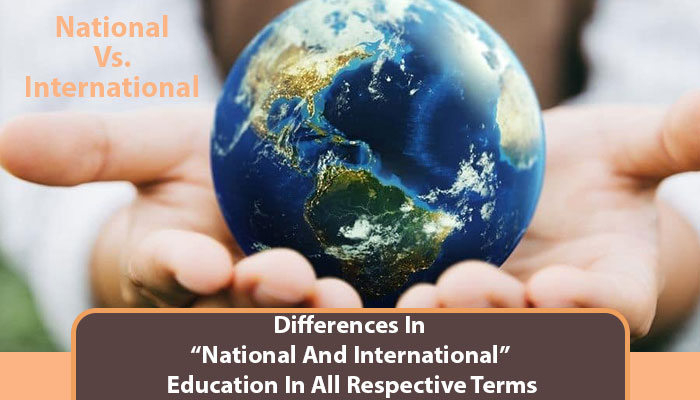Differences In National And International Education In All Respective Terms
October 17, 2022 • 1978 Views

Study abroad expert advice
Don't waste time! just fill the form to get help.
National and international education are both different types of studies and offer contrasting experiences. According to Trade.gov, every year 59,000+ students from Pakistan visit foreign countries to study abroad.
National education refers to studying in your native living country while in international studies, you go abroad for better and advanced studies. But, what’s the practical difference between national and international studies?
Below is a detailed article on the difference between national and international education in all respective terms:
Country And People Of The Foreign Country
The influence of the new country depends on what country you’ve chosen, as every country follows its unique cultures and traditions. For example, Asian people follow their traditional Asian culture, and western countries follow their western culture.
You’ll meet new people from different cultures and different races. It can develop cultural shock due to different experiences which can take weeks to months for your mind to adapt.
Reasons of US Visa Rejection

Language Barriers In Foreign Study
If you’re going to an English-speaking country where the native language is English, then the language barrier will be less than none. Most students can understand English to some extent and over time the human mind adapts to the fluency of the new language.

However, if you’re visiting a non-English speaking country, then the language barrier could be an issue for you. Especially, Asian and northern European countries that aren't English influenced. Therefore, you either have to learn their local native language or use a translator most of the time.
How To Study Abroad Without IELTS Or TOEFL For All Countries
Concept Of Studies
International education from a renowned institute usually has different concepts of study. They are more focused on skills and practicals than theoretical studies. However, it completely depends on the institute you’re choosing.

A renowned international university will focus on dedicated practical experience rather than theoretical studies. On the contrary, most national colleges or universities are only limited to theoretical studies.
Value Of The Degree In International Institutes
Western countries' institutes usually have a better value of the degree. Most of the national-grade universities or colleges don't comply with international standards. It’s because of the quality of education that western and European countries offer.

After studying at an international university or college, your degree will likely have better value than the local institutes. Moreover, international universities will give you the opportunity to look for a job in the same country from where you studied.
But that’s not always the case, if your degree is from a substandard university or college even if it’s in a western country, your degree will not have significant value. But in the end, it’s always your skills that make you hired in any company.
Study MBBS In Malaysia
Budget In National And International Education
Budget plays a crucial role in international education. Foreign education is always an exorbitant education, while national-level education can fall in a budget for most of the middle segment people.
Due to currency value differences, the fees of international institutes will always be higher than local institutes. Moreover, living place rent, transportation, food, flight tickets and miscellaneous expenses are also involved in the international education budget.
While in national grade education, the major budget is consumed by the institute fees and transportation (if the institute is located near your living area).
Here’s a small table for studying abroad vs local studies (estimation):
Budget |
Local Studies |
International Studies |
|---|---|---|
|
Institute fee |
Rs.140,000/semester |
Rs.900,000/semester |
|
Living rent |
0 |
Rs.65,000/month |
|
Food |
Rs.0-10,000 |
Rs.60,000/month |
|
Transport |
Rs.15,000 |
Rs.20,000 |
|
Misc. |
Rs.20,000 |
Rs.95,000 |

Working Opportunities In UK And Canada While Studying Abroad
Related News
Consultants for Pakistan
Latest Scholarships
-
 UK
UKRhodes Scholarship 2026 Fully Funded at University of Oxford UK
-
 Germany
GermanyDAAD STIBET Scholarships at RWTH Aachen Support for Highly Engaged International Students in Germany
-
 United-Arab-Emirates
United-Arab-EmiratesKhalifa University Scholarship 2026 in UAE Fully Funded with IELTS Exemption
-
 Germany
GermanyYouth Development Forum 2026 in Berlin, Germany Fully Funded











.png)
.png)